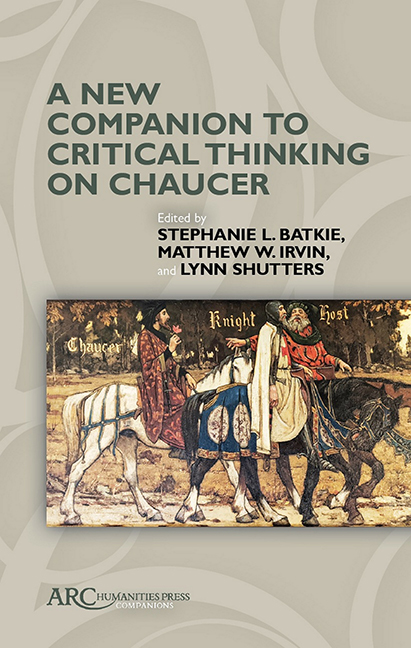Book contents
Thing
Published online by Cambridge University Press: 21 October 2021
Summary
Legend of Good Women
Truth
ARGUING THAT CHAUCER'S poetry is full of things would seem to be claiming the obvious. Things are, of course, all over the place in Chaucer's poetry: the pilgrims of the General Prologue achieve their sharp characterization in large part through the clothes they wear and effects they carry; the tales of the Canterbury collection are likewise brimming with things that are crucial to plot and theme (the hot coulter of the Miller's Tale, the book of scripture in the Man of Law's Tale, Griselda's shift in the Clerk's Tale, the rocks of the Franklin's Tale, to name only a few examples); early dream visions like the House of Fame and the Parliament of Fowls prominently feature objects of landscape (trees, sand, a glacier even) and architecture (temples, engravings, gates, walls); and even Chaucer's short, lyric poems like the Former Age are littered with things and materials. Indeed, Chaucer's inclusion of so many and so many kinds of things gives his poetry a feeling of materiality that has in part contributed to the notion that Chaucer looked past his own, fourteenth-century moment by composing “realistic” narratives made so because of the real-seeming people who live in real, physical worlds full of palpable objects. What happens, then, when we try to think about things in Chaucer as things? What interpretive opportunities might that open—and how exactly might one do that?
As the title of this chapter suggests, I hope to take on these questions by thinking carefully about Chaucerian things. My own approach will be grounded in the theoretical framework of what I’ll call “object” or “matter” studies, a variegated collection of philosophical and theoretical writing that seeks to reshape our understanding of what things, objects, and matter are and what our relationship is to them. Scholars have taken increasing interest in the matter and things of medieval literature and culture, but to focus my effort here, I’d like to take a somewhat different approach, looking closely not at a particular object or thing, but at Chaucer's use of the word “thing” itself. In important instances, Chaucer uses this word in a way that emphasizes how things (objects, matter, seemingly inanimate materials) take on a “life of their own” —that is, they exhibit a kind of energy, a potential for action, even an agency— while never ceasing to be objects and things. Matter and object studies gives us a vocabulary to think about what this means and how this happens. When Chaucer uses a word like “thing,” he not only signals this kind of agency, but also uses that conceptualization of agency to think about other complex literary and cultural ideas. To provide examples of how the word “thing” might be working in this way, I want to concentrate on two texts: the Legend of Good Women, the tale collection that precedes the Canterbury Tales, and the short lyric poem Truth.
- Type
- Chapter
- Information
- A New Companion to Critical Thinking on Chaucer , pp. 201 - 216Publisher: Amsterdam University PressPrint publication year: 2021

